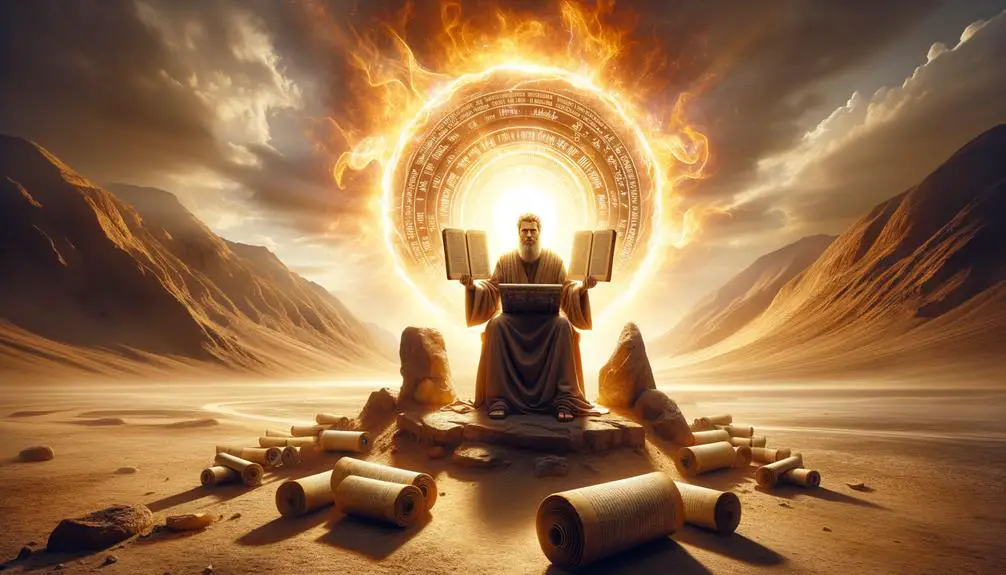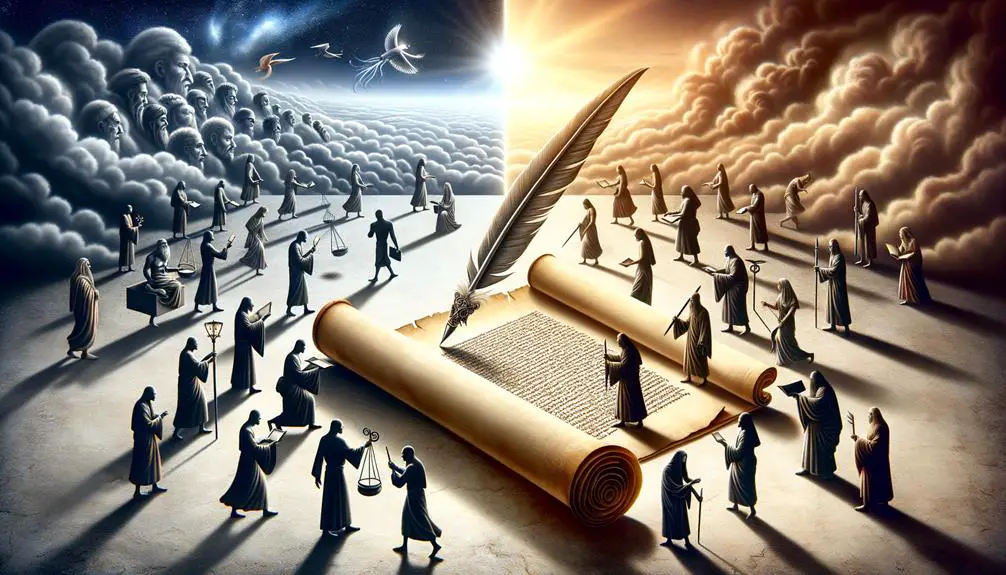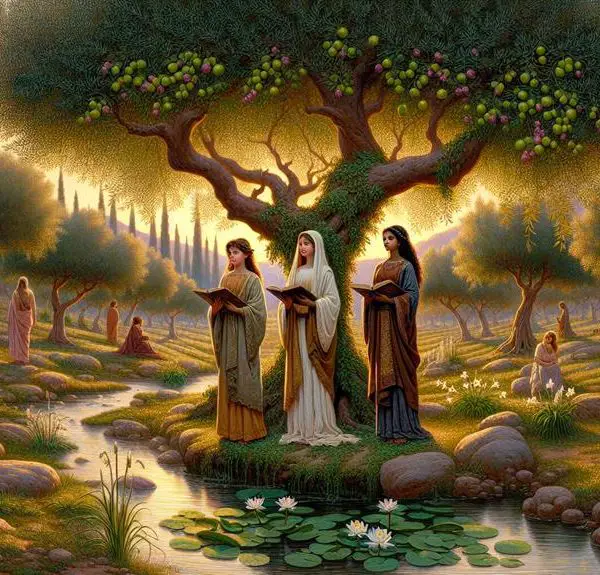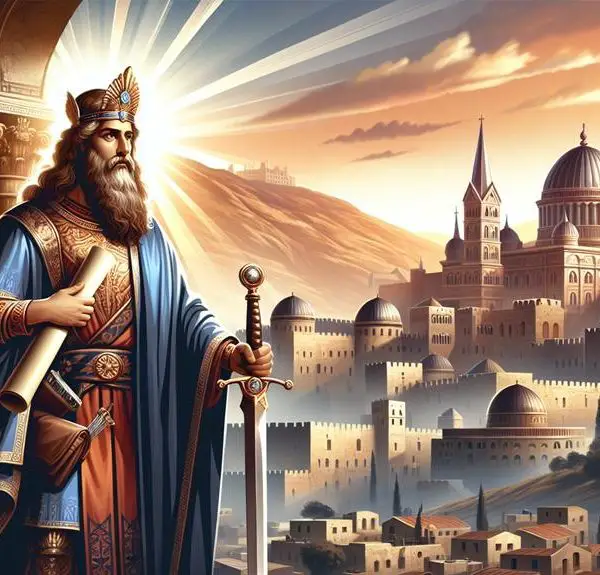Mysteries surround the authorship of Genesis, hinting at ancient secrets and scholarly debates that challenge traditional views.

Who Wrote the Book of Genesis in the Holy Bible
Imagine you've always been told that Moses penned the Book of Genesis, a foundational text in many religious traditions. This traditional view, however, faces scrutiny when you consider the complexities of authorship.
The Documentary Hypothesis, for instance, suggests multiple authors over centuries contributed to its creation. By exploring the historical context, literary analysis, and archaeological insights, you're about to uncover layers of this ancient narrative that might challenge long-held beliefs.
Let's navigate these intriguing waters together, and perhaps you'll find a deeper understanding of Genesis and its implications for modern believers.
Key Takeaways
- Moses is traditionally attributed as the author of Genesis, though this view has evolved.
- The Documentary Hypothesis suggests Genesis was compiled from multiple sources (JEDP).
- Ancient authorship theories consider influences from surrounding societies and oral traditions.
- Scholarly analysis includes dating, cultural context, and literary forms to understand Genesis' origins.
The Traditional View: Moses

Traditionally, Moses is credited with authoring the Book of Genesis, a view deeply embedded in Judeo-Christian tradition. This perspective isn't merely a matter of religious dogma but rests on a blend of textual analysis, historical inference, and theological understanding. Central to this viewpoint is the assumption of Moses' literacy and his leadership role, which are seen as vital prerequisites for the composition of such a foundational text.
Analyzing Moses' literacy, you'll find it plausible within the context of his upbringing. As someone raised in the Egyptian royal court, Moses would have been educated in the art of writing and communication, skills essential for leadership and governance. This background supports the notion that he had the capability to author the extensive narratives found in Genesis.
Furthermore, Moses' leadership role is a crucial element in understanding the traditional attribution of Genesis to him. As the leader of the Israelites, he was in a unique position to compile, edit, or author the texts that would serve to define the nascent Israelite identity and religious belief. The Book of Genesis, with its stories of creation, covenant, and early patriarchs, would have served as a foundational narrative, helping to solidify the communal identity and faith of the Israelite people.
Historical Context of Genesis
Understanding the historical context of Genesis requires you to consider the ancient authorship theories and the book's cultural origins.
These aspects shed light on how Genesis was influenced by the surrounding societies and their narratives.
Analyzing these points provides a deeper insight into its composition and significance within a broader historical framework.
Ancient Authorship Theories
Theories about the authorship of Genesis, dating back to ancient times, suggest a complex blend of oral traditions and written sources. You'll find that scholars often point to Sumerian influences and Gilgamesh parallels as foundational elements within Genesis' narrative structure. This view underscores the intertextual connections between ancient Near Eastern texts and the Book of Genesis, suggesting a shared cultural and literary heritage.
Aspect |
Description |
Significance |
|---|---|---|
Sumerian Influences |
Elements mirroring Sumerian mythology and epics. |
Indicates cross-cultural interactions and exchanges. |
Gilgamesh Parallels |
Similarities in flood narratives and hero journeys. |
Highlights the shared motifs in ancient storytelling. |
Oral Traditions |
Genesis as a product of long-standing oral traditions. |
Suggests a communal process in the formation of the text. |
This analytical framework provides a deeper understanding of Genesis' origins within the rich tapestry of ancient Near Eastern literature.
Genesis' Cultural Origins
To grasp the historical context of Genesis, you must consider its emergence from a milieu deeply embedded in the cultural and religious practices of the ancient Near East. This setting is crucial for understanding how Genesis' creation narratives and mythological archetypes aren't isolated phenomena but rather a part of a broader tapestry of ancient storytelling.
You'll find that these narratives echo the themes and motifs prevalent in Mesopotamian, Egyptian, and Canaanite cultures, among others. The adoption and adaptation of these elements within Genesis highlight a sophisticated process of cultural and theological synthesis.
The Documentary Hypothesis

Scholars propose that the Book of Genesis, as well as other parts of the Torah, weren't authored by a single individual but are the amalgamation of texts from multiple sources, a theory known as the Documentary Hypothesis. This perspective emerged from rigorous textual criticism and source analysis, challenging traditional views on the authorship of these sacred texts.
You'll find that textual criticism is a scholarly method involving the examination of the text itself to identify its origins, variations, and history. Through this lens, experts have observed inconsistencies, repetitions, and stylistic differences within the Book of Genesis that suggest it's the work of multiple authors rather than a single voice. Source analysis further supports this by identifying distinct themes and theological perspectives that seem to originate from different communities or traditions within ancient Israel.
The implications of the Documentary Hypothesis are significant, as it suggests that the Book of Genesis, traditionally attributed to Moses, is instead a complex compilation that evolved over time. This theory doesn't detract from the religious or cultural significance of the text but offers a deeper understanding of its historical context and development.
Unpacking the JEDP Theory
Diving into the JEDP Theory, we find it dissects the Book of Genesis into four main sources, each with its unique characteristics and historical context. This approach, known as source criticism, provides a framework for understanding the composite nature of Genesis and its textual variants. By examining these sources, you'll gain a clearer insight into the complexity of biblical texts and the methods scholars use to study them.
To paint a picture of how the JEDP Theory operates, consider the following:
- J (Yahwist source): Characterized by a vivid, narrative style, it presents God in anthropomorphic terms, closely interacting with humans. This source is thought to reflect an earlier period of Israelite history, providing foundational stories with a particular theological and moral viewpoint.
- E (Elohist source): The Elohist source often focuses on themes of prophecy and fear of God, using the name Elohim to refer to God. It likely originates from the northern kingdom of Israel and emphasizes morality and covenant faithfulness.
- D (Deuteronomic source) and P (Priestly source): These sources are known for their distinct perspectives and stylistic features. The Deuteronomic source contains sermons and legal materials, stressing loyalty to God, while the Priestly source offers detailed accounts of rituals, genealogies, and laws, reflecting a concern for cleanliness, holiness, and order.
Through source criticism, scholars analyze textual variants and piece together the historical and cultural contexts of these sources, offering a richer understanding of Genesis's composition and evolution over time.
Archaeological Insights

Archaeological discoveries have played a pivotal role in understanding the origins and authorship of the Book of Genesis.
You'll find that ancient manuscripts unearthed shed light on its dating, offering insights into scholarly approaches and interpretations.
These findings also unveil the cultural contexts within which Genesis was written, providing a deeper comprehension of its contents and significance.
Ancient Manuscripts Unearthed
Recent excavations have unveiled ancient manuscripts that provide new insights into the origins and authorship of the Book of Genesis. These discoveries shed light on:
- Preservation techniques used in ancient times to protect these sacred texts from the ravages of time and environment.
- Translation discrepancies that have emerged over centuries, highlighting the complexity of interpreting ancient languages and the subsequent impact on understanding biblical texts.
- The meticulous care taken by scribes to record these texts, underscoring the reverence held for these writings.
This newfound evidence offers a fascinating glimpse into the past, presenting a more nuanced understanding of how the Book of Genesis has been preserved, translated, and interpreted throughout history. Such scholarly investigations continue to enrich our comprehension of this foundational biblical book.
Dating Genesis: Scholarly Approaches
Several scholars have embarked on a quest to pinpoint the historical period in which the Book of Genesis was written, employing a variety of archaeological insights to inform their analyses. Through the application of radiometric dating techniques, they've analyzed artifacts and materials associated with early biblical manuscripts. This method allows for the estimation of the ages of these objects, providing a temporal framework for when Genesis might've been penned.
Additionally, paleographical methods have been instrumental. By examining the style and characteristics of the writing on ancient papyri and inscriptions, scholars deduce the timeframe of Genesis's composition. These approaches, grounded in meticulous examination and scientific methods, offer a robust foundation for understanding the historical context of this foundational biblical text, steering clear of speculative conclusions.
Cultural Contexts Revealed
Delving into the cultural contexts of the Book of Genesis, one discovers that archaeological finds have illuminated the lifestyles, beliefs, and societal structures of the ancient peoples depicted within its pages. These insights offer a deeper understanding of the text through:
- Ethnographic parallels that compare ancient practices described in Genesis with those uncovered in archaeological sites, highlighting similarities in rituals and social norms.
- Sociolinguistic influences that reveal how language evolution and dialects shaped the narratives, offering clues to the historical and geographical contexts of the stories.
- Artifacts and ecofacts that provide tangible evidence of the material culture, economy, and environmental conditions, grounding the biblical stories in real-world settings.
Together, these elements enrich our comprehension of Genesis by framing it within its authentic ancient milieu.
Literary Analysis of Genesis

Analyzing the Book of Genesis reveals a complex narrative structure that skillfully intertwines themes of creation, fall, and redemption. This initial book of the Bible is not just a collection of random stories; rather, it's a meticulously crafted narrative, with each part contributing to the overarching message. The thematic motifs of promise and covenant, for example, serve as threads that connect various narratives, highlighting the relationship between humanity and the divine.
Here's a glance at the narrative structure and thematic motifs within Genesis:
Section |
Theme |
Key Motif |
|---|---|---|
Creation |
Order from chaos |
God's sovereignty |
Fall |
Disobedience and exile |
Human frailty |
Redemption |
Promise and covenant |
Divine faithfulness |
This table summarizes how Genesis is divided into distinct sections, each tackling fundamental aspects of human existence and divine interaction. From the poetic accounts of creation that open Genesis to the complex family narratives of Abraham, Isaac, Jacob, and Joseph, the book employs a variety of literary forms. These include genealogies, legal codes, and narrative stories, all serving to advance its key themes.
You'll notice that the narrative structure of Genesis allows for a deep exploration of its themes. The stories are not merely historical accounts but serve as vessels for conveying profound truths about human nature, divine providence, and the possibility of redemption. Through its complex narrative and thematic motifs, Genesis sets the stage for the biblical message, inviting readers into a reflective engagement with its content.
Comparing Religious Perspectives
Comparing religious perspectives reveals how different traditions interpret the Book of Genesis, each adding unique insights and understandings to its narratives. Through interfaith dialogues, scholars and believers explore these varied viewpoints, deepening the collective grasp of these ancient texts. The Creation myths, in particular, offer fertile ground for such discussions, showcasing the rich tapestry of belief systems that have interacted with Genesis over millennia.
To paint a picture for you:
- Judaism sees Genesis as the foundational text of the Torah, emphasizing the covenant between God and the patriarchs. Its interpretations often focus on the moral and ethical lessons embedded within the Creation story and subsequent narratives, highlighting the responsibilities of humanity to God and each other.
- Christianity interprets Genesis both literally and metaphorically, with its narratives serving as a precursor to the New Testament teachings. The concept of Original Sin, derived from the Adam and Eve story, plays a crucial role in understanding human nature and the need for salvation through Jesus Christ.
- Islam regards the Quran as correcting or supplementing the narratives found in Genesis, with figures like Adam, Noah, and Abraham seen as prophets. The Creation myth in Islam shares similarities with the Biblical account but is interpreted within a distinctly Islamic theological framework, emphasizing monotheism and God's ultimate authority.
Through such comparisons, you gain not only a deeper understanding of Genesis itself but also of how it sits within a global religious context. Interfaith dialogues, by exploring these divergent interpretations, enrich the study of religious texts by highlighting their multifaceted nature and the varied ways in which communities find meaning in them.
Implications for Modern Believers

Exploring the diverse interpretations of the Book of Genesis across religious traditions brings us to consider its enduring relevance and impact on modern believers. It's crucial to recognize how this foundational text influences ethical reflections and faith modernization in contemporary society. As you delve into the narratives of Genesis, you're confronted with themes of creation, morality, and human nature that resonate across millennia, inviting you to reflect on their application in today's world.
Your engagement with Genesis isn't just about understanding ancient stories; it's about how these narratives shape your moral compass and inform your beliefs in a rapidly evolving world. The process of faith modernization involves integrating these age-old lessons with modern ethical dilemmas and societal changes. You're tasked with interpreting these stories in a way that respects traditional values while addressing contemporary issues.
The ethical reflections prompted by Genesis aren't static; they evolve as society changes. You're encouraged to wrestle with the text, questioning and reinterpreting it in light of new knowledge and circumstances. This dynamic engagement with the Book of Genesis ensures its continued relevance and helps you navigate the complexities of modern life with a foundation rooted in ancient wisdom.
Frequently Asked Questions
How Has the Interpretation of Genesis Evolved With the Advent of Modern Science, Especially in Relation to the Creation Narrative?
With modern science's advances, your understanding of Genesis, especially its creation narrative, has evolved significantly. Cosmic evolution and geological evidence have reshaped interpretations, challenging literal readings and fostering a more metaphorical or allegorical approach.
This shift reflects a reconciliation between faith and empirical evidence, encouraging you to view the Genesis story through a lens that integrates scientific discoveries with spiritual truths, thus enriching your comprehension of this ancient text.
In What Ways Have Non-Abrahamic Religions and Philosophies Influenced the Narratives Found in Genesis?
You'll find the tapestry of Genesis enriched by threads from outside gardens, particularly through Mesopotamian myths and Zoroastrian influence. These elements weave through the narratives, offering a broader cultural exchange that predates monotheistic clarity.
The epics and philosophical insights from these traditions have subtly shaped Genesis, introducing concepts and narratives that resonate with ancient Near Eastern thought, demonstrating a complex interplay of ideas that have left their mark on this foundational text.
How Do Contemporary Jewish and Christian Scholars Reconcile Discrepancies and Contradictions Within the Text of Genesis?
You'll find that contemporary Jewish and Christian scholars employ textual analysis to tackle discrepancies within Genesis. They delve into the authorship debate, meticulously examining historical, linguistic, and cultural contexts to understand these contradictions better.
What Role Does the Book of Genesis Play in Popular Culture, Literature, and Art Throughout History?
Genesis has woven its threads through the fabric of popular culture, its stories echoing in literature, art, and even in Genesis inspired movies.
You'll find its influence in the creation myths prevalent in many video games, where worlds are born and legends crafted.
This ancient text acts as a wellspring for creativity, providing a foundational narrative that artists and writers across centuries have drawn upon to explore themes of creation, morality, and human nature.
How Do Feminist and Queer Theologians Interpret the Gender Dynamics and Roles Presented in Genesis?
You'll find that feminist and queer theologians often challenge the traditional interpretations of Genesis, focusing on the patriarchal narratives that have dominated its readings.
They delve into queer readings to uncover the layers of gender dynamics and roles, offering fresh perspectives that question and critique the established norms.
Conclusion
In conclusion, you've navigated the complex terrain surrounding the authorship of Genesis.
While tradition credits Moses, the JEDP theory, supported by archaeological and literary analysis, suggests a more nuanced reality.
This exploration across time, akin to using a smartphone in ancient Mesopotamia, reveals the layered composition of this foundational text.
For modern believers, understanding these perspectives enriches their faith, inviting a deeper engagement with the text's historical and spiritual dimensions.



Sign up